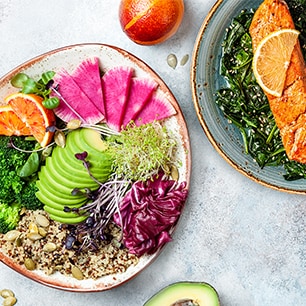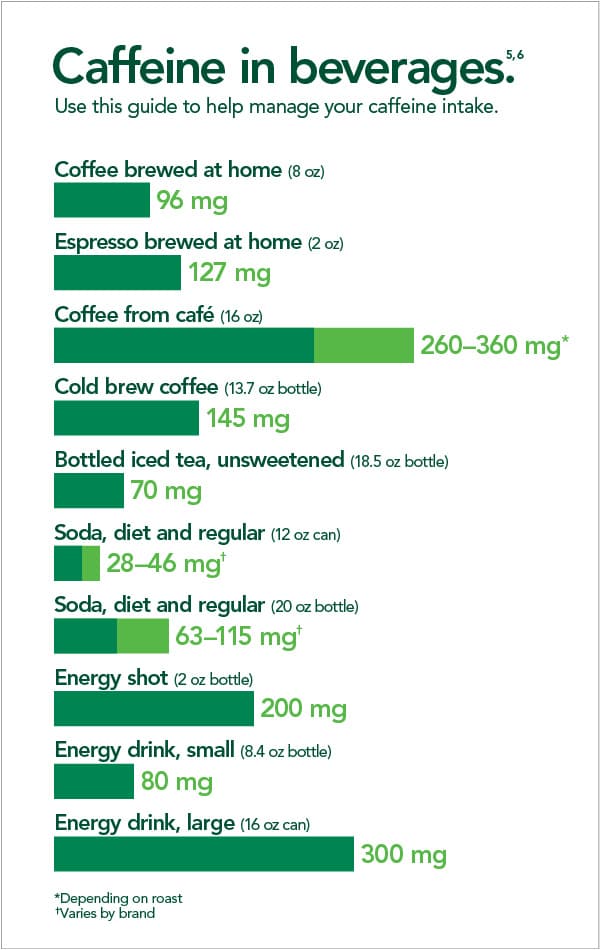Are you drained, tired, and stressed out much of the time? There may be a number of reasons you feel this way, from a busy lifestyle and overscheduling to lack of sleep and poor eating habits. The truth is that nutrition plays a key role in how you feel on a daily basis.
Small shifts toward better dietary choices can make a world of difference. Let’s explore some simple ways to improve your nutrition and help maintain a healthy energy level.

7 Ways to Balance Your Nutrition
Smart nutrition can help you achieve the balance you’re looking for. Start by focusing on these key areas of your food routine.
-
Choose nutrient-dense foods. Fruits, vegetables, whole grains, seafood, lean meats and poultry, eggs, beans and legumes, oils, nuts, and seeds are high in nutrients that can help put your diet on the right track. Learn how to incorporate a variety of foods to build balanced meals.
-
Make room for omega-3s. Omega-3 fatty acids may play a role in the development and maintenance of brain function. Your body also uses them for energy, tissue growth, and more.1 Sources of EPA and DHA omega-3s include cold-water fish such as salmon, trout, oysters, crab, mussels, catfish, clams, and flounder.2
Our Better Choice salmon recipes offer many delicious ways to get omega-3s. Discover more about the link between seafood and brain health.
-
Don’t skip meals. Eating on a schedule is an important foundation for maintaining a balanced diet. Regular mealtimes help prevent fluctuations in your appetite hormones.3 Skipping meals may lead you to consume more food later in the day. Plus, if you wait until your hunger is at its peak, you're more likely to eat past the point of fullness or even comfort.
Do you often miss breakfast because you’re in a hurry? Work in these simple breakfast solutions.
-
Plan ahead for better meals. Meal planning can help you maintain a balanced diet that meets your nutritional needs. We can make it easier for you.
- Create your menu and shopping list for the upcoming week. Save time by ordering with Publix delivery or curbside pickup. Powered by Instacart.*
- Take advantage of our fast and smart meal ideas, shortcuts, and shopping tips to eat better in a time crunch.
- Looking for simple recipes to feed your family? Try our Shiitake-Herb Chicken Sauté or Pan-Roasted Fish with Rice and Cilantro-Edamame Pesto.
-
Snack wisely. Never underestimate the power of a smart snack. It can bridge gaps between meals, especially when you’re on the go and can’t stop to eat a complete meal. Choose nutrient-dense snacks such as fruits, vegetables, whole grains, low-fat dairy, nuts, and seeds to give you the fuel you need to keep moving forward. Check out these smart snacking ideas.
-
Don’t overdo caffeine. Keep your caffeine intake moderate. Coffee, sodas, and other caffeinated drinks may help you stay alert, but too much can affect your sleep and overall energy level. According to the FDA, up to 400 milligrams per day (four or five cups of coffee) for healthy adults is not generally associated with negative effects. It’s important to note, however, that each person’s sensitivity to and rate of caffeine metabolism may vary.4
There’s a wide range of caffeine content in beverages—and serving size matters. The FDA does not require caffeine content disclosure. Energy drinks typically contain about 80–90 milligrams of caffeine, comparable in caffeine levels to an average 8-ounce cup of coffee (100 milligrams). However, these drinks often come in much larger 24- or 32-ounce cans that contain three or four servings of the beverage.

-
Be cautious about energy supplements. When fatigue kicks in, it may be tempting to reach for an energy drink or supplement containing ingredients such as guarana, green tea, vitamins, CoQ10, and ginseng. Many of these products claim to boost your energy. Keep in mind that the FDA regulates dietary supplements under a different set of policies than foods or drugs, and does not review them for safety or efficacy before they are marketed.7
- Do your research! For questions about supplements and their claims, start with the National Institutes of Health’s U.S. National Library of Medicine resource.
- Don’t rely on supplements as cure-alls or as replacements for eating a balanced diet, managing stress, or getting enough sleep.
- Be sure to consult your physician before taking a supplement.
*Prices vary from in-store. Fees, tips & taxes may apply. Subject to terms & availability.
For the Love of You
Choosing how you eat is uniquely personal. It’s about your needs, your preferences, and your goals. As your wellness ally, we're in your corner with fresh ideas, recipes, and wellness icons that make it easier to shift toward wiser food choices. It’s all about you, at your very best.
Sources
1 National Institutes of Health (NIH): Office of Dietary Supplements. Omega-3 Fatty Acids: Fact Sheet for Health Professionals. U.S. Department of Health & Human Services (HHS). October 17, 2019.
2 Which Fish Is the Richest in Omega-3s? Image. Seafood Nutrition Partnership. Accessed December 18, 2019.
3 McCulloch, Marsha, MS, RD, LD. Appetite Hormones. Today's Dietitian 17, no. 7 (July 2015): 26.
4 Spilling the Beans: How Much Caffeine is Too Much? U.S. Food & Drug Administration (FDA). Accessed December 18, 2019.
5 Caffeine Chart. Center for Science in the Public Interest. Accessed December 18, 2019.
6 Food Data Central. Coffee, brewed. U.S. Department of Agriculture: Agricultural Research Service. April 1, 2019.
7 U.S. Department of Health & Human Services (HHS). Dietary Supplements: What You Need to Know. National Institutes of Health (NIH): Office of Dietary Supplements. January 15, 2020.

 You are about to leave publix.com and enter the Instacart site that they operate and control. Publix’s delivery and curbside pickup item prices are higher than item prices in physical store locations. Prices are based on data collected in store and are subject to delays and errors. Fees, tips & taxes may apply. Subject to terms & availability. Publix Liquors orders cannot be combined with grocery delivery. Drink Responsibly. Be 21. For prescription delivery, log in to your pharmacy account by using the Publix Pharmacy app or visiting
You are about to leave publix.com and enter the Instacart site that they operate and control. Publix’s delivery and curbside pickup item prices are higher than item prices in physical store locations. Prices are based on data collected in store and are subject to delays and errors. Fees, tips & taxes may apply. Subject to terms & availability. Publix Liquors orders cannot be combined with grocery delivery. Drink Responsibly. Be 21. For prescription delivery, log in to your pharmacy account by using the Publix Pharmacy app or visiting 
